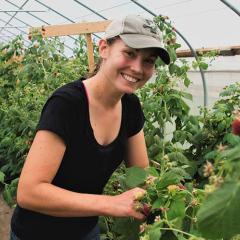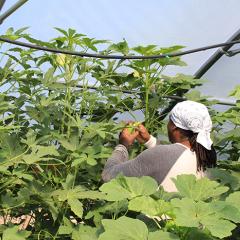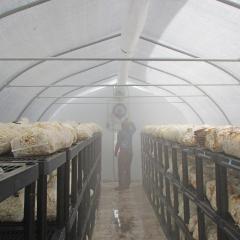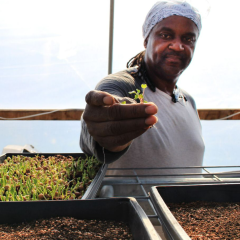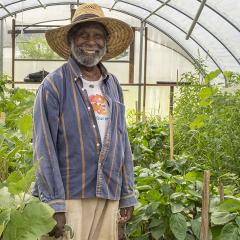Success Stories: NRCS' Work with High Tunnel
Breadcrumb
- Home
- Getting Assistance
- Organic Agriculture
- Success Stories: NRCS' Work with High Tunnel
Learn about the benefits of high tunnels with our success stories.
Advance Payment Helps Extend the Season
Meet Alisha Utter and Kyle Bowley, of Arbor Farmstead in Grand Isle, Vermont. Their seven-acre veganic farm grows diversified perennial fruit alongside restorative woodland.
From Football to Farming: Urban Agriculture in Dallas
Join us as we tour three urban farms and meet farmers who are growing food for their local communities.
Growing Urban – A Lower West Side Story
Carrie Nader and Alexander Wadsworth own Westside Tilth Farm in Buffalo, New York. This urban farm is situated on about three-fourths of an acre spanning a few lots on the corner of a block in the Lower West Side region of the city.
Goats and Gardens in Jackson, Mississippi
Meet Cindy Ayers-Elliott, a CEO-turned-farmer who raises goats and grows fresh produce in Jackson, Mississippi.
A Sprouting Business
Garland Hampton is making a difference in his neighborhood by growing affordable, healthy food closer to the people who need it the most.
Conservation Nets Better Irrigation, Saves Money and Doubles Growing Space to Boost Profits
Before working with NRCS, Matt Churchill and Jennifer Christian, owners of Pariah Dog Farm, used to irrigate their crops by filling up 500-gallon water tanks with a garden hose overnight, then hauling them out to the field the next morning.
Related Information
Success Stories: NRCS’ Work with Organic Producers
Learn more about organic farming through our featured success stories.
Growing All Seasons: High Tunnels
High tunnels protect plants from severe weather and allow farmers to extend their growing seasons – growing earlier into the spring, later into the fall, and sometimes, year-round.
NRCS Assistance for Organic Farmers
Learn about the many areas in which NRCS provides assistance to organic producers, from biodiversity to weed management.
High Tunnel Initiative
A High Tunnel System, commonly called a “hoop house,” is an increasingly popular conservation practice for farmers, and is available with financial assistance through the Environmental Quality Incentives Program (EQIP).


